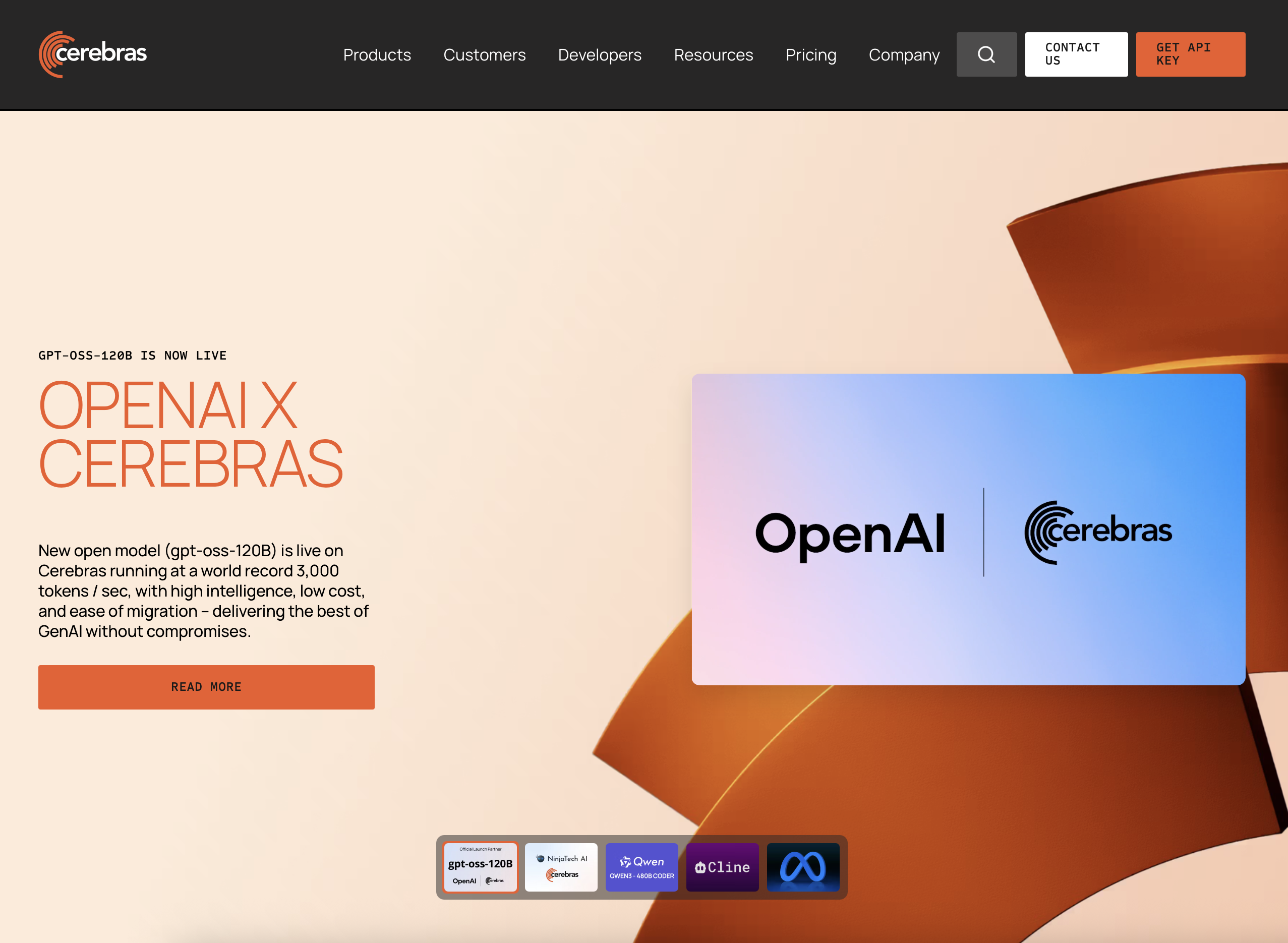Cerebras Systems
AI HardwareAI chip company creating the world's largest processors specifically designed for artificial intelligence training and inference.

Cerebras Systems company profile
Overview
Cerebras Systems has revolutionized AI computing by taking a radically different approach to chip design. While traditional processors use small silicon chips, Cerebras builds processors from entire silicon wafers—creating the world’s largest computer chips specifically optimized for artificial intelligence workloads.
Founded in 2016 by semiconductor veterans Andrew Feldman and Sean Lie, Cerebras addresses the fundamental challenge of AI training: the massive computational requirements of modern deep learning models. Their wafer-scale approach eliminates many bottlenecks that limit traditional GPU-based systems, enabling faster training of larger models.
Wafer-Scale Engine
Innovative Architecture
The Wafer-Scale Engine (WSE) represents a significant advancement in processor design:
| Specification | WSE-2 | WSE-3 | Traditional GPU |
|---|---|---|---|
| Cores | 850,000 | 900,000 | ~10,000 |
| Transistors | 2.6 trillion | 4+ trillion | ~50 billion |
| Memory | 40 GB on-chip | 44 GB on-chip | 80 GB off-chip |
| Memory Bandwidth | 20 PB/s | 21 PB/s | ~2 TB/s |
| Die Size | 46,225 mm² | 46,225 mm² | ~800 mm² |
Technical Advantages
Massive Parallelism: With nearly a million cores, WSE can process AI workloads with unprecedented parallelism.
On-Chip Memory: All memory is directly on the processor, eliminating the latency and bandwidth limitations of external memory.
High-Speed Interconnect: Cores communicate through a 2D mesh network optimized for AI data patterns.
No Memory Wall: Unlike traditional systems, there’s no bottleneck between processor and memory.
Product Portfolio
CS-2 System
The CS-2 represents the second generation of Cerebras’ AI training systems:
- Single WSE-2 processor
- Air-cooled design for standard data centers
- Software stack optimized for popular AI frameworks
- Turnkey solution for AI training workloads
CS-3 Next Generation
The latest CS-3 system introduces:
- WSE-3 processor with enhanced performance
- Improved software optimization
- Better integration with existing ML workflows
- Enhanced debugging and profiling tools
Cerebras Cloud
Democratizing access to wafer-scale computing:
- On-demand access to CS-2 systems
- Pay-per-use pricing model
- Pre-configured environments for popular models
- API access for seamless integration
Technology Advantage
Speed Benefits
Cerebras systems deliver significant training speedups:
- Language Models: 10-100x faster training than GPU clusters
- Computer Vision: Dramatic reduction in training time for image models
- Scientific Computing: Acceleration of physics simulations and molecular modeling
Simplified Infrastructure
Single System Solution: What typically requires hundreds of GPUs can often be replaced by a single CS system.
Reduced Complexity: Eliminates the need for complex multi-node networking and synchronization.
Energy Efficiency: Despite size, often more energy-efficient than equivalent GPU clusters.
Software Integration
Cerebras provides comprehensive software support:
- Native integration with PyTorch and TensorFlow
- Optimized implementations of common AI operations
- Automated model optimization and compilation
- Comprehensive debugging and profiling tools
Market Impact
As AI models grow larger, traditional approaches face scaling challenges that Cerebras uniquely addresses:
Addressing AI Training Bottlenecks
- Communication bottlenecks in multi-GPU systems
- Memory bandwidth limitations
- Complex distributed training requirements
Cerebras addresses these challenges with a fundamentally different approach.
Industry Adoption
Early adopters include:
- Research Institutions: Universities using CS systems for breakthrough AI research
- National Laboratories: Government facilities for scientific computing
- Enterprises: Companies training large proprietary models
- Pharmaceutical: Drug discovery applications requiring massive compute
Competitive Landscape
Cerebras competes with:
- Traditional GPU providers (NVIDIA, AMD)
- Other AI chip startups (Graphcore, SambaNova)
- Cloud providers’ custom silicon (Google TPU, AWS Trainium)
Investment and Growth
With over $715 million in funding, Cerebras has:
- Built manufacturing partnerships with TSMC
- Established global sales and support teams
- Developed comprehensive software ecosystem
- Created strategic partnerships with system integrators
Future Vision
Cerebras continues pushing the boundaries of AI computing through several key initiatives:
Next-Generation Technology
- Advanced WSE: Even larger and more powerful processors
- Inference Optimization: Adapting wafer-scale approach for AI inference
- Cloud Expansion: Broader availability of Cerebras Cloud services
- Software Evolution: Enhanced development tools and framework support
Market Expansion
- New Applications: Exploring scientific computing and simulation workloads
- Global Reach: Expanding international presence and partnerships
- Vertical Solutions: Industry-specific AI acceleration offerings
Innovation Leadership
The company’s radical approach to AI hardware design positions it uniquely as AI models continue to scale, offering an alternative path forward as traditional approaches face fundamental limitations. Their wafer-scale philosophy represents a significant approach that could influence the future of AI computing infrastructure.
